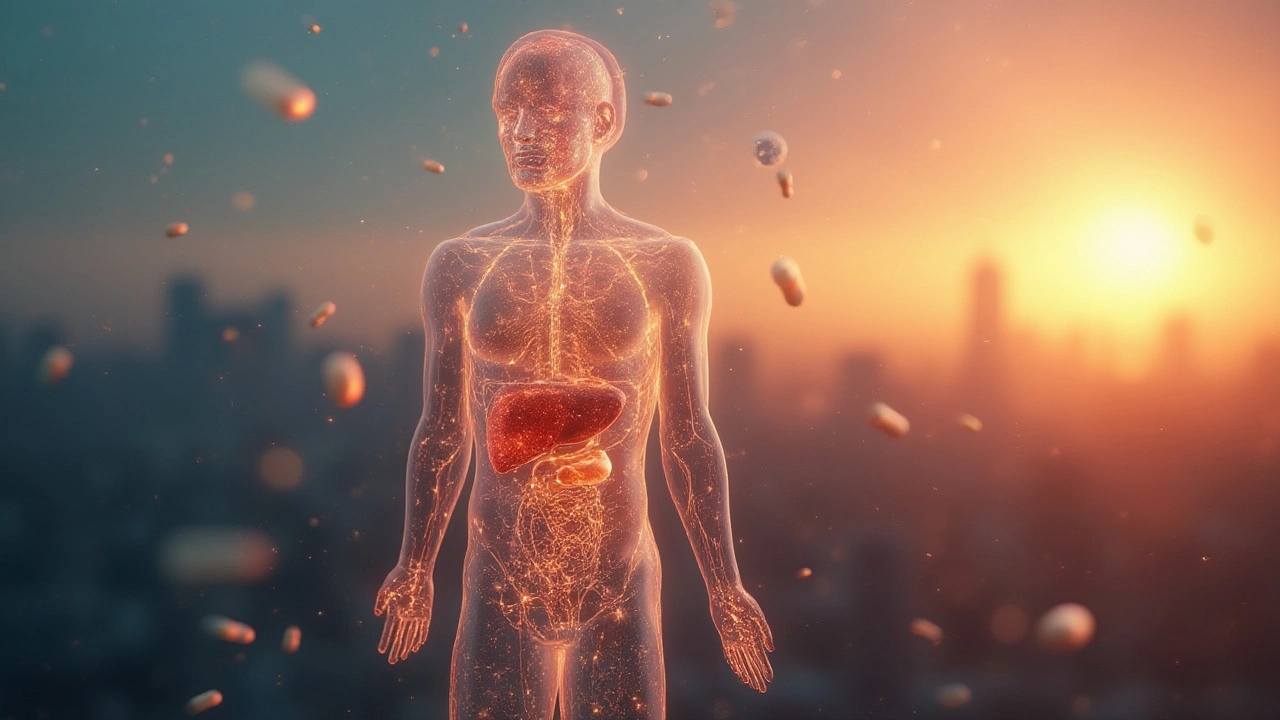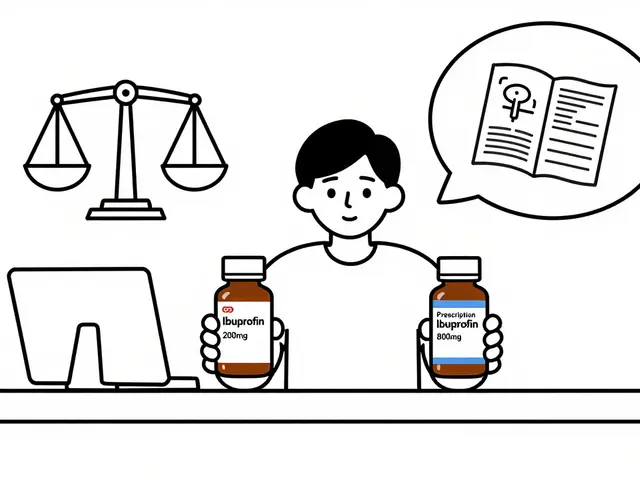
If you’ve ever watched someone you care about struggle with liver disease, you know the biggest fear isn’t always the liver itself — it’s what liver failure can do to the brain. Sounds dramatic, but the truth is, there’s nothing scarier than seeing the mind slip away while the body still fights on. There’s this medical term — hepatic encephalopathy — which means the brain gets affected because the liver can’t clean up toxins from the blood. But here’s where things get interesting: a little medicine called ursodiol is quietly making waves in how doctors try to protect the brain when the liver starts failing.
Understanding the Enemy: Encephalopathy and How the Liver Affects the Brain
Liver disease isn’t just about swollen bellies or jaundiced skin. When the liver gets sluggish or scarred (hello, cirrhosis), toxins like ammonia start to build up. Imagine your liver as a bouncer at a club, keeping out the troublemakers; once that bouncer clocks out, it’s a wild party, and the brain suffers the consequences. Hepatic encephalopathy touches up to 50% of people with cirrhosis at some point, which makes these mental changes one of the scariest, yet often overlooked, problems in chronic liver disease.
The symptoms sneak in — sleepiness in the day, confusion at night, sometimes even personality changes or twitchy hands doctors call “asterixis.” In severe cases, a person can slip into a coma. Why does this happen? Mostly it’s because the damaged liver can’t turn ammonia (a waste product of protein breakdown) into urea, so it builds up and crosses into the brain. But, ammonia isn’t acting alone. There are forgotten players, like inflammation, gut bacteria spilling into the bloodstream, or even subtle micronutrient shortages. It’s complicated, but the more we learn, the more we realize “brain fog” in liver disease isn’t just about ammonia, and it isn’t just about the liver either.
Ursodiol: The Unlikely Hero of Liver Disease
Ursodiol, sometimes called ursodeoxycholic acid (quite a mouthful), isn’t new. It’s been used for decades to treat gallstones and a type of chronic liver disease called primary biliary cholangitis. But doctors are starting to dig deeper into its hidden strengths. Ursodiol works by thinning out bile, making it less toxic, and even protecting cells from some of the chemical insults thrown their way when livers get sick.
Here’s what makes it interesting for brain protection: Several studies, including recent work out of European liver centers in 2023, point out that ursodiol’s anti-inflammatory punch, combined with its ability to improve bile flow, might help reduce some of the ‘spillover’ toxins that affect the brain. In animal models — and increasingly in real human data — ursodiol seems to dial down that dangerous inflammation and keep the gut-liver-brain axis calmer. Think of it as a dampener on the fireworks show happening in a failing liver.
What’s wild is that people who take ursodiol for chronic liver issues (like PSC or PBC) report fewer episodes of confusion or mental changes. While nobody’s calling ursodiol a magic bullet for encephalopathy yet, the pieces are starting to line up: better bile flow, less toxic buildup, and a friendlier environment for your brain.

Digging Into the Facts: How Ursodiol Might Prevent Encephalopathy
Let’s get into some specifics. Encephalopathy isn’t a single switch that flips; it’s a series of bad dominoes falling: increased gut permeability, inflammatory chemical release, bad bugs from the intestines, and way too much ammonia. Ursodiol, the underdog, tackles a few of these at once — not by directly lowering ammonia, but by treating the gut and liver like a delicate dance.
The best evidence so far? Studies from 2022–2024 looked at hundreds of patients with bile duct diseases and cirrhosis. Those who got steady doses of ursodiol (usually 13–15 mg/kg/day) showed lower markers of inflammation in bloodwork, fewer mental status changes, and better cognitive testing scores over six months. In animal experiments, rats with induced liver failure who got ursodiol had less swelling and fewer signs of brain trouble.
Some researchers in Barcelona even spotted changes in the gut bacteria of people treated with ursodiol. After a few months, the bad bacteria numbers dropped, the ‘good’ bacteria grew, and the bloodstream cleared out fewer nasty toxins that mess with brain function. Throw in the fact that ursodiol’s pretty safe — nausea and diarrhea are the most common complaints — and doctors are paying a lot more attention. If you’re on the lookout for hard proof, keep an eye on ongoing clinical trials, since big answers might be around the corner.
Everyday Tips for Liver Patients Worried About Their Brain
Ursodiol isn’t a one-stop solution. It fits into a bigger plan that includes what you eat, how you move, and keeping other risks low. Here’s what people — and their families — can do day-to-day, based on what works in real life:
- Stick to your meds: If your doctor prescribes ursodiol, don’t skip doses. Missing a few pills won’t tank your liver overnight, but steady levels are key.
- Watch for mental changes: Don’t ignore weird sleepiness, mood swings, forgetfulness, or shaky hands — they’re early warning signs. Family and friends often spot problems before you do.
- Eat smart: Go easy on animal protein if you have cirrhosis. Plant-based proteins are gentler on your gut.
- Stay hydrated: Dehydration can push you into encephalopathy faster than you think. Keep a water bottle close, especially in the summer.
- Don’t self-treat: Laxatives like lactulose work differently than ursodiol. Doctors sometimes use both for stubborn cases, but never mix or tweak doses without a chat first.
- Keep infections at bay: Washing hands, avoiding raw seafood, and getting vaccinated helps, since infections can spark an encephalopathy episode.
- Avoid sedatives: Many sleep meds or anti-anxiety pills can tip the scales toward confusion in damaged livers. Always ask if new medicines are safe with liver disease.
- Regular blood work: Ammonia levels aren’t the whole story, but simple labs can catch other issues before they hurt your brain.
- Talk about plans: If you (or a loved one) starts slipping mentally, talk to your doctor early. Don’t wait for a crisis.
It’s a lot to juggle, but just knowing what to look for — and how to act early — can be the edge that keeps the brain sharp for years.

The Future: New Research and Hope for Liver-Brain Protection
People used to think once the brain gets cloudy in liver disease, you just have to ride it out. That’s changing, fast. Researchers now talk about ‘gut-brain-liver axis’ therapies, which basically means the best way to help the brain is to treat the whole system, not just fix lab numbers.
Ursodiol’s getting attention because it’s safe, tested, and cheap, but also because it naturally shapes the body’s chemistry without big risks. New trials are combining ursodiol with probiotics, prebiotics, and even designer antibiotics to keep the gut’s bacteria balanced and block that dangerous domino fall toward encephalopathy. There’s even early work on using modified bile acids to plug leaks in the blood-brain barrier, directly shielding the brain when things get rough.
Living with chronic liver disease still means staying alert, getting regular checks, and building a good relationship with your doctor. But the more we learn about meds like ursodiol, the less hopeless encephalopathy feels. For people — and families — worried about that next episode of foggy thinking or confusion, medicines like ursodiol provide something rare: real hope and practical steps to keep the mind strong, even when the liver is struggling.




10 Comments
Wow, ursodiol's role in safeguarding the brain really highlights how interconnected our organs truly are.
It's fascinating to consider how a bile acid like ursodiol can mitigate encephalopathy, which is essentially brain dysfunction due to liver disease. The biochemical interplay here is so deep and elegant.
Also, this kind of research reminds me of the broader philosophical question about how much we still don't understand about the body's ability to heal and protect itself.
I'd be super curious to know if there are any cutting-edge studies showing long-term outcomes with ursodiol treatment in this specific context?
Or even potential side effects one should watch out for when using it as a neuroprotective agent?
Such a complex topic deserves layered discussion. I'm impressed by the science behind this.
Anyone else fascinated by how such treatments evolve?
Honestly, while the science sounds impressive, it's sometimes hard not to get a bit skeptical about miracle drugs.
This whole thing about ursodiol protecting our brain from encephalopathy makes me wonder how much hype vs. genuine efficacy is involved here.
We hear so many promises, but the practical, real-world results may be less dramatic than expected. 🙄
That said, I do appreciate the effort to spread awareness and the detail in explaining the science behind it.
It’s just that I’m a bit cautious when drugs get marketed as protective shields.
And don’t get me started on the accessibility issues and costs for those who really need it.
Anyway, I'd love to hear more grounded experiences from actual patients or clinicians.
Okay, I have to admit, this topic makes me feel hopeful!!
Like, for those facing liver disease, knowing that ursodiol can potentially shield the brain from such serious complications is kinda reassuring, you know?
Sometimes medical info feels so cold and scary, but this feels like a light at the end of the tunnel.
Isn’t it amazing what modern medicine keeps uncovering? 🌟
Though I did stumble over some of the technical bits, I felt like the tips were really useful.
Anyone here using ursodiol and wanna share how it’s helped?
Would love to hear some firsthand good vibes!
While I appreciate the scientific enthusiasm, we need to be cautious with terms like "safeguard" when referring to ursodiol.
The pathophysiology of hepatic encephalopathy is complex, involving multifactorial neurotoxicity that ursodiol only partially addresses.
Rhetorically framing ursodiol as a brain protector risks oversimplification and may mislead patients about its actual efficacy.
Indeed, controlled clinical trials highlight that while ursodiol can mitigate some cholestatic injuries, its neuroprotective effects remain questionably significant.
We must avoid the Pandora's box of overpromising benefits to vulnerable populations.
Critical assessment of biochemical pathways and pharmacodynamics is imperative before heralding ursodiol as a neuroprotector.
Otherwise, we contribute to therapeutic misconception without scientific rigor.
Thanks for breaking this down! It’s great to see something that helps people with liver disease also shielding the brain.
I think it’s so important that we support each other in understanding treatments better, especially when they involve something as complicated as the brain and liver interaction.
This kind of info can really empower patients to have better discussions with their doctors.
Practical tips alongside scientific facts make it less intimidating.
Does anyone know if ursodiol is widely accessible? Or if doctors typically recommend it as a preventative for encephalopathy?
Also, are there lifestyle changes that can complement its effects?
Would love to learn more!
Really interesting to see how ursodiol modulates the bile acid pool to prevent neurotoxic ammonia buildup.
This is an elegant example of biochemical cross-talk between the liver and brain, dampening neuroinflammation.
Often, the subtlety of metabolic pathways is overlooked, but this reminds us that small molecular shifts can make a huge clinical difference.
I appreciate the practical tips here too; scientific knowledge coupled with real-world applications is gold.
Just curious, does the timing of ursodiol administration affect its protective efficacy?
And how personalized can the treatment be depending on the stage of liver disease?
Would love to hear thoughts from others as well.
Good overview here, the connection between liver treatment and brain health is crucial.
From a practical standpoint, ursodiol is pretty straightforward to use, which helps with compliance.
It’s important to keep realistic expectations though—it's a supportive therapy, not a cure.
Managing liver disease requires a holistic approach and ursodiol is a helpful tool in the arsenal.
Anybody experienced benefits or side effects worth noting?
This is really helpful info especially with simple tips 🥰
I wonder if taking ursodiol alone is enough or if you have to combine it with other treatments to really protect the brain?
Also, are there any dietary tips that people with liver disease should focus on along with this medication?
It can be overwhelming but small steps add up, right?
Thanks for sharing this post 😊
Such discussions evoke complex deliberations on pharmacokinetics and neurochemical implications.
Ursodiol's efficacy in encephalopathy is multifaceted and nuanced, involving bile acid modulation, glutamate receptor interaction, and ammonia clearance.
Nonetheless, a critical reader must interrogate the robustness of clinical data and the statistical significance underlying claimed neuroprotective outcomes.
Furthermore, the pharmacodynamic variability across populations necessitates personalized dosing regimens rather than a one-size-fits-all approach.
An interdisciplinary dialogue between hepatologists, neurologists, and pharmacologists is indispensable here to fully elucidate ursodiol's role.
The post scratches the surface but leaves room for a deeper scientific excavation.
Anyone else delving into the latest clinical trials on this?
Oh great, another "miracle" drug to save the day 🙄.
Seriously though, the post does a decent job explaining ursodiol's role but let's not kid ourselves that it’s a panacea.
Encephalopathy is nasty and complicated, and any single treatment is a small piece of a larger puzzle.
Still, I appreciate the calm, formal approach to a topic that often gets hyped in less thoughtful spaces.
The practical tips are a nice touch, even if slightly on the optimistic side.
It’d be nice to have more data on how patients actually feel using it — quality of life perspective matters.
Anyway, worth keeping an eye on further research.